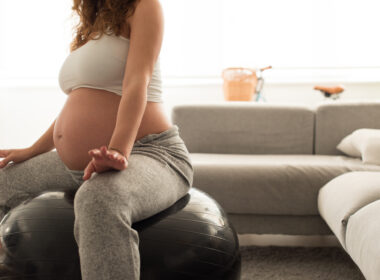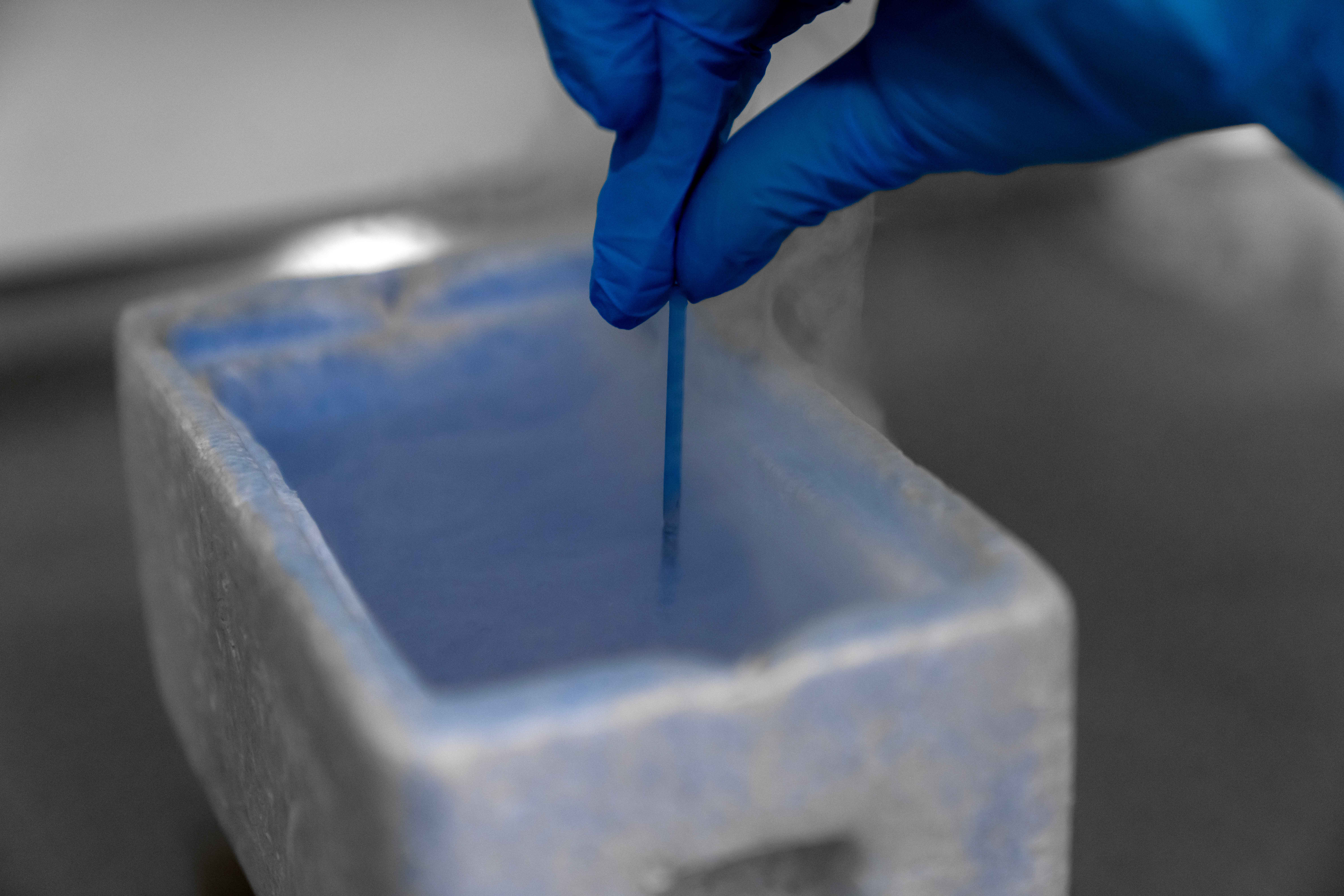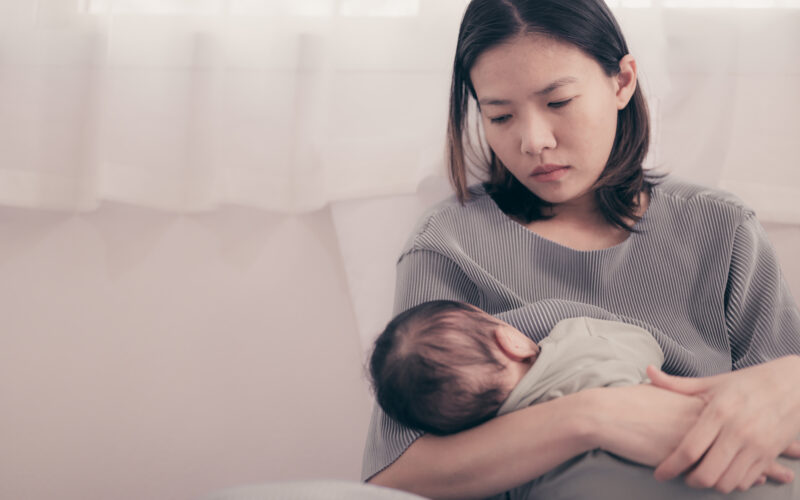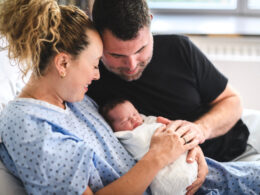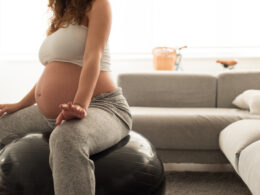What is postpartum depression?
Like depression, postpartum depression (PPD) is a serious mental health issue requiring medical attention. The Diagnostic and Statistical Manual of Mental Disorders, Fifth Edition (DSM-5) defines depression “with peripartum onset” as a major depressive episode (MDE) during pregnancy or within four weeks after parturition.
PPD is specifically depression that follows the birth of a child. While approximately 70% of women experience “the baby blues” after giving birth, the feelings of sadness and anxiety associated with the baby blues typically only last for a few days postpartum. The symptoms of postpartum depression are more severe and last for two or more weeks.
What does postpartum depression feel like?
The symptoms of PPD can vary from woman to woman. Symptoms can include feelings of intense sadness, depression, anxiety, anger, restlessness, fear, and intrusive thoughts. Crying, fatigue, loss of appetite, weight loss or weight gain, and insomnia are also common PPD symptoms. Although suicide is rare, some women with PPD may have thoughts of harming themselves, and some may have intrusive thoughts of harming their baby. These thoughts could also be a sign of postpartum psychosis (more on this below).
Laura recently shared her personal experience with postpartum depression with Natural Womanhood. Read about her journey with PPD, here.
Who can get postpartum depression?
According to the CDC, postpartum depression affects approximately 1 in 8 American women after childbirth. Some states may have PPD rates as high as 1 in 5 new mothers. Any woman who has just given birth can experience PPD, and even some new fathers experience it, too.
Some individuals may be more at-risk for developing PPD than others. According to the Mayo Clinic, risk factors for PPD include:
- A personal or family history of depression or other mental illness, such as bipolar disorder
- Having already experienced postpartum depression after the birth of a previous child
- Having a multiple birth (i.e., twins, triplets, etc.)
- Experiencing pregnancy or childbirth complications
- Having a child with special needs and/or health problems
- Financial issues
- Lack of personal support / relationship issues with spouse or partner
- Difficulty breastfeeding
Do you think that you might be at risk for postpartum depression? Click here to learn more about symptoms and treatment methods.
When does postpartum depression start? Can postpartum depression start later?
If you’re wondering if PPD can start at four, seven, or even eight months after giving birth, the answer is “yes.” According to the American College of Obstetricians and Gynecologists (ACOG), PPD can occur anytime within one year after the birth of a child. Most commonly, however, symptoms begin within 1-3 weeks of giving birth.
An episode of depression can also occur during the pregnancy, and should be a ‘trigger’ for an obstetrician to suspect an increased risk for PPD; the patient should be seen sooner in the office after delivery to assess, before the usual 6 week visit.
Can postpartum depression come and go?
As with clinically-diagnosed depression, PPD symptoms are persistent. If your symptoms come and go, yet you are still concerned that you may have PPD, talk to your doctor.
Why does postpartum depression happen?
There is no single cause of PPD. Contributing factors can be due to a combination of genetics, the physical changes a woman undergoes after giving birth (especially hormonal changes, such as seriously low progesterone), the various risk factors discussed above, and the difficulties/life changes that come from caring for a newborn.
To learn more about the impact of progesterone on your health, including your risk for PPD, check out the following resource:
Progesterone Deficiency: How Too Little Progesterone Can Mean Big Problems
How is postpartum depression diagnosed?
Doctors commonly use the Edinburgh Postnatal Depression Scale (EPDS) to help screen women for postpartum depression at their 6-8 week postpartum follow-up visit. A ten-question, self-rated scale, the Edinburgh Postnatal Depression Scale helps doctors see how new mothers have been feeling over the course of the past seven days. ACOG recommends that “all obstetrician–gynecologists and other obstetric care providers complete a full assessment of mood and emotional well-being (including screening for postpartum depression and anxiety with a validated instrument) during the comprehensive postpartum visit for each patient.” The Edinburgh Postnatal Depression Scale has been translated into multiple languages, and is widely used across the world for PPD screening.
How is postpartum depression treated?
Treatment for postpartum depression may include one of the following options, or some combination of them:
Hormone Therapy
Because PPD may, in part, be due to the hormonal changes a woman undergoes after giving birth, treatment with bioidentical progesterone may help significantly resolve PPD symptoms.
To learn more about treatment of postpartum depression with bioidentical progesterone, check out the following resources:
A Promising New Treatment for Postpartum Depression
The Use of Progesterone Supplements in Treating Postpartum Depression
“Isn’t NaProTechnology Just Charting?” and other questions: A Natural Womanhood NaPro FAQ
Antidepressant Medication
Some women may need to begin an antidepressant medication in order to combat their PPD. If you have concerns about the compatibility of antidepressant medication and breastfeeding, be sure to talk them over with your doctor.
Psychotherapy
Psychotherapy (sometimes in conjunction with hormone therapy or antidepressant medication) may be beneficial for some women who are suffering from PPD. Various forms of psychotherapy that may be used to treat PPD, including Cognitive Behavioral Therapy and Interpersonal Therapy.
Does postpartum depression affect relationships?
Postpartum depression can impact your relationships, especially with your spouse and child or children, and can make it especially difficult to bond with your new baby. Postpartum depression can especially impact the breastfeeding relationship between a mother and baby, and difficulties breastfeeding can make postpartum depression more likely. Marital discord can both contribute to, and arise from postpartum depression.
Can postpartum depression affect the baby?
According to womenshealth.gov, “Researchers believe postpartum depression in a mother can affect her child throughout childhood, causing:
- Delays in language development and problems learning
- Problems with mother-child bonding
- Behavior problems
- More crying or agitation
- Shorter height and higher risk of obesity in preschoolers
- Problems dealing with stress and adjusting to school and other social situations”
Getting help for your postpartum depression will therefore not only benefit your health, but that of your child’s as well.
Will postpartum depression go away on its own?
According to MedicalNewsToday, postpartum depression can last for months or years if left untreated. If you suspect that you may have postpartum depression, do not feel ashamed of the condition or suffer in silence. If you or someone you love suspects that you many have PPD, you should talk to your doctor about it as soon as possible.
What is postpartum psychosis? How is postpartum psychosis different from postpartum depression?
According to the National Alliance on Mental Illness, “psychosis is characterized as disruptions to a person’s thoughts and perceptions that make it difficult for them to recognize what is real and what isn’t.” Postpartum psychosis is a rare, but extremely serious psychotic disorder arising in the postpartum period, which requires immediate medical attention. According to UpToDate.com (a software system used by many clinicians as an evidence-based clinical resource):
“Women with postpartum psychosis develop rapid onset of psychotic symptoms, including hallucinations and delusions, bizarre behavior, confusion, and disorganization that may appear to be delirium. Postpartum psychosis is most often seen in patients that have been or will be diagnosed with bipolar disorder, but can also occur in women with a major depression with psychosis, schizophrenia, or schizoaffective disorder. A subset of women experience isolated postpartum psychosis that does not progress to mood or psychotic episodes outside the postpartum time period.”
Improving mental health with fertility awareness
No matter where you are in your fertility or mental health journey, charting your cycles with a fertility awareness method (FAM) or natural family planning (NFP) can benefit your mental health. For more on FAMs and mental health, check out the following resources:
The Benefits of Charting for Your Mental Health
4 Ways Fertility Awareness Methods Can Improve Mental Health
Woman’s Depression and Mental Illness Symptoms Disappear After Getting Off the Pill
Easing the postpartum period
For more tips on easing the postpartum transition (including information on FAM charting and family planning postpartum), check out these resources:
Three Science-backed, Natural Ways to Ease Childbirth and the Postpartum Period
Three New Technologies to Revolutionize the Postpartum Period
How Placenta Encapsulation Can Help You Postpartum
12 Relatable Instagram Accounts for New Moms to Follow
Deciphering the Postpartum Period with FABMs
What’s the Best Postpartum Fertility Awareness-Based Method?
Good and Bad News Concerning the LAM Method During the Postpartum Period
When this article refers to fertility awareness methods (FAM), or natural family planning (NFP), we are referring to Fertility Awareness-Based Methods, evidence-based methods of cycle charting which can be used as effective forms of natural birth control when learned by a certified instructor.


